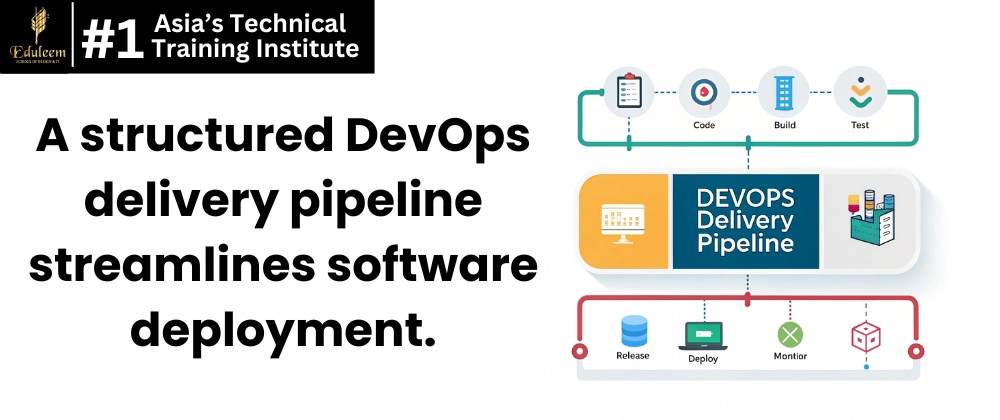In today’s fast-paced IT world, organizations need to deliver software faster, more efficiently, and with higher reliability. That’s where the DevOps Delivery Pipeline comes into play.
A well-structured DevOps pipeline ensures seamless software deployment, automating processes from code development to production release. Whether you’re an aspiring DevOps engineer or a software professional, mastering the DevOps pipeline is essential for career growth.
If you're searching for the best DevOps training in Bangalore, this blog will give you a deep dive into the DevOps Delivery Pipeline, its key components, and best practices.
What is the DevOps Delivery Pipeline?
The DevOps Delivery Pipeline is a series of automated steps that allow developers to write, test, and deploy software efficiently. It integrates CI/CD (Continuous Integration & Continuous Deployment) to streamline the development, testing, and deployment processes.
This pipeline ensures that code changes are quickly and safely delivered to production, reducing manual errors and enhancing collaboration between development and operations teams.
Key Stages of the DevOps Delivery Pipeline
The DevOps pipeline consists of several key stages that work together to ensure seamless software delivery:
1. Plan
- Define project requirements and roadmap.
- Collaborate with stakeholders using Agile methodologies.
2. Develop (Code)
- Developers write and commit code to a version control system (e.g., Git, GitHub, GitLab).
- Code is reviewed and merged via pull requests.
3. Build
- The build phase compiles code into an executable format.
- Tools like Maven, Gradle, and Jenkins automate this process.
4. Test
- Automated testing ensures that the code is bug-free.
- Popular testing tools include Selenium, JUnit, and TestNG.
5. Release
- Once the code passes tests, it is packaged and prepared for deployment.
- Configuration management tools like Ansible, Chef, and Puppet help with deployment automation.
6. Deploy
- The application is deployed to production or staging environments.
- Containerization tools like Docker and Kubernetes ensure scalability.
7. Monitor & Feedback
- Performance monitoring tools like Prometheus, Grafana, and ELK Stack track system health.
- Automated alerts ensure quick issue resolution.
💡 Pro Tip: Implementing a strong CI/CD pipeline can reduce deployment failures by up to 90%!
Why is the DevOps pipeline important?
✔️ Faster Software Releases: Automates manual tasks and accelerates deployment.
✔️ Better Collaboration: Bridges the gap between development and operations teams.
✔️ Improved Code Quality: Continuous testing and monitoring catch issues early.
✔️ Scalability: Easily scale infrastructure using cloud-based tools.
✔️ Enhanced Security: Secure coding and monitoring reduce vulnerabilities.
📌 Want to Ace the AWS Certified Solutions Architect—Associate Exam?
Check out our step-by-step guide: AWS Certified Solutions Architect—Associate Exam: Preparation Guide
Best Practices for Building a Robust DevOps Pipeline
🚀 Use Infrastructure as Code (IaC): Automate infrastructure with Terraform and AWS CloudFormation.
🔄 Automate Everything: From testing to deployment, automation speeds up the process.
📊 Monitor Performance: Use centralized logging and monitoring tools.
💡 Implement Security Measures: Shift security left by integrating DevSecOps.
🤝 Foster a DevOps culture: Encourage collaboration and feedback.
DevOps Career Opportunities & Training
With high demand for DevOps professionals, Bangalore is one of the best cities to pursue a DevOps course.
💼 Top job roles in DevOps:
✔️ DevOps Engineer
✔️ Site Reliability Engineer (SRE)
✔️ Release Manager
✔️ Automation Engineer
🎯 Why Choose Eduleem for DevOps Training in Bangalore?
✅ Hands-on Training: Work on real-world DevOps projects.
✅ Expert Mentors: Learn from experienced DevOps professionals.
✅ Internships & Placement Assistance: Get job-ready with industry exposure.
✅ Certifications: Prepare for AWS, Azure, and DevOps certifications.
🚀 Take your DevOps career to the next level with Eduleem!
🔗 Enroll Now at Eduleem—AWS, DevOps, Azure, GCP, and AI Training in Bangalore!
Conclusion
Mastering the DevOps Delivery Pipeline is essential for modern software development. By understanding CI/CD, automation, and monitoring, developers and IT professionals can streamline software releases while enhancing security and collaboration.
If you’re looking for the best DevOps training in Bangalore, make sure your DevOps course covers:
✅ CI/CD Implementation
✅ Containerization & Kubernetes
✅ Infrastructure as Code (IaC)
✅ Monitoring and Security Practices
📌 Have you implemented a DevOps pipeline in your project? Share your experience in the comments!



Top comments (0)